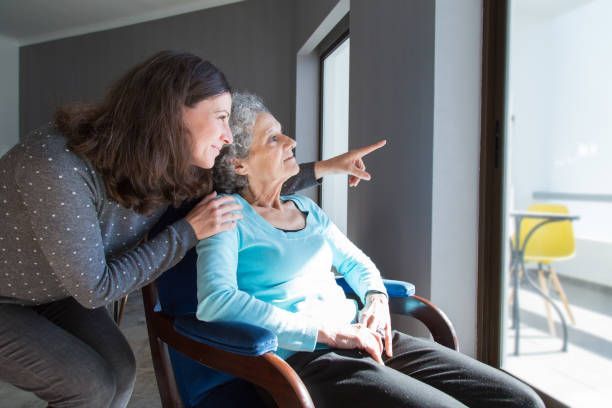Signs It's Time to Transition from Companion Care to Personal Home Care
Is it time to recognize the need for personal care?
As your loved ones age, their care needs may evolve, and it's crucial to ensure they receive the appropriate level of assistance and support to maintain their quality of life. Companion care and personal home care are two types of in-home care services designed to meet various needs, but they differ significantly in their scope and intensity. In this comprehensive guide, we will explore the differences between companion care and personal home care, and we will provide you with valuable insights into the signs that indicate it might be time to transition from companion care to personal home care.
Companion Care vs. Personal Home Care: Understanding the Difference
Companion Care:
Companion care is a non-medical form of in-home care that focuses on providing companionship, emotional support, and other assistance that does not require hands on personal care. It is often an ideal choice for seniors who are still relatively independent but may need some help with tasks such as light housekeeping, meal preparation, medication reminders, transportation, and social interaction. Companion caregivers offer companionship and engage in activities that enhance the overall well-being of their clients.
Personal Home Care:
Personal home care, on the other hand, provides a higher level of assistance and is often required by individuals with more significant care needs. Personal caregivers or Home Health Aides are trained to offer a wider range of services, including assistance with activities of daily living (ADLs) such as bathing, dressing, grooming, toileting, and mobility assistance. Personal home care is also suitable for those who require more extensive assistance with meal preparation, medication management, and assistance with daily living activities.
Signs It's Time to Transition to Personal Home Care
- Difficulty with Activities of Daily Living (ADLs):
One of the most apparent signs that it's time to transition to personal home care is when your loved one struggles with basic ADLs. According to the National Council on Aging, 40% of people aged 85 and older need assistance with at least one ADL, such as bathing or dressing.
2. Increased Risk of Falls:
Falls are a significant concern among seniors, and the risk increases with age. The Centers for Disease Control and Prevention (CDC) reports that falls are the leading cause of both fatal and non-fatal injuries among older adults. If your loved one has experienced falls or is at high risk, personal home care can provide the necessary support and supervision to prevent accidents.
3. Progression of Chronic Health Conditions:
Chronic health conditions such as Alzheimer's disease, Parkinson's disease, or diabetes can worsen over time, requiring more specialized care. The Alzheimer's Association reports that more than 5 million Americans are living with Alzheimer's disease, making dementia-related care a significant consideration.
4. Complex Medication Management:
Managing multiple medications can be challenging, especially for seniors with several prescriptions. According to the American Pharmacists Association, medication non-adherence is a significant concern, with up to 50% of patients not taking their medications as prescribed. Personal home care can ensure proper medication management and administration.
5. Increased Isolation and Loneliness:
While companion care offers companionship, personal home care can provide a higher level of social interaction and emotional support. According to the AARP Foundation, social isolation is a significant issue for older adults, leading to adverse health outcomes.
6. Nutritional Concerns:
Malnutrition and dehydration can be common issues among seniors. The National Resource Center on Nutrition, Physical Activity, and Aging reports that approximately one in four older adults has poor nutrition. Personal home care can address these concerns by assisting with meal planning and preparation.
7. Worsening Cognitive Function:
For seniors with cognitive impairments such as dementia, the need for personal home care becomes more critical as the condition progresses. The Alzheimer's Association estimates that nearly two-thirds of Americans with Alzheimer's disease are women.
8. Family Caregiver Burnout:
When family members are the primary caregivers, the demands of caregiving can take a toll on their own well-being. The Family Caregiver Alliance reports that 40-70% of family caregivers show signs of clinical depression.
9. Doctor's Recommendations:
If a healthcare professional recommends a higher level of care, it's essential to heed their advice. Medical experts can assess your loved one's condition and determine the appropriate level of care needed for their safety and well-being.
Choosing between companion care and personal home care is a decision that should be made based on your loved one's individual needs and circumstances. Recognizing the signs that indicate it's time to transition to personal home care is essential for ensuring their safety, health, and overall quality of life.
At 7 Day Home Care, we understand that each client is unique, and we offer a range of personalized in-home care services in Manhattan, Queens, Brooklyn, Nassau County, and Suffolk County, New York.
Our team of dedicated caregivers is trained to provide the right level of care to meet your loved one's specific requirements. If you're considering a transition from companion care to personal home care or have any questions about our services, please don't hesitate to reach out to us. Your loved one's well-being is our top priority, and we are here to support you every step of the way.
Brian Callahan
7 Day Home Care










